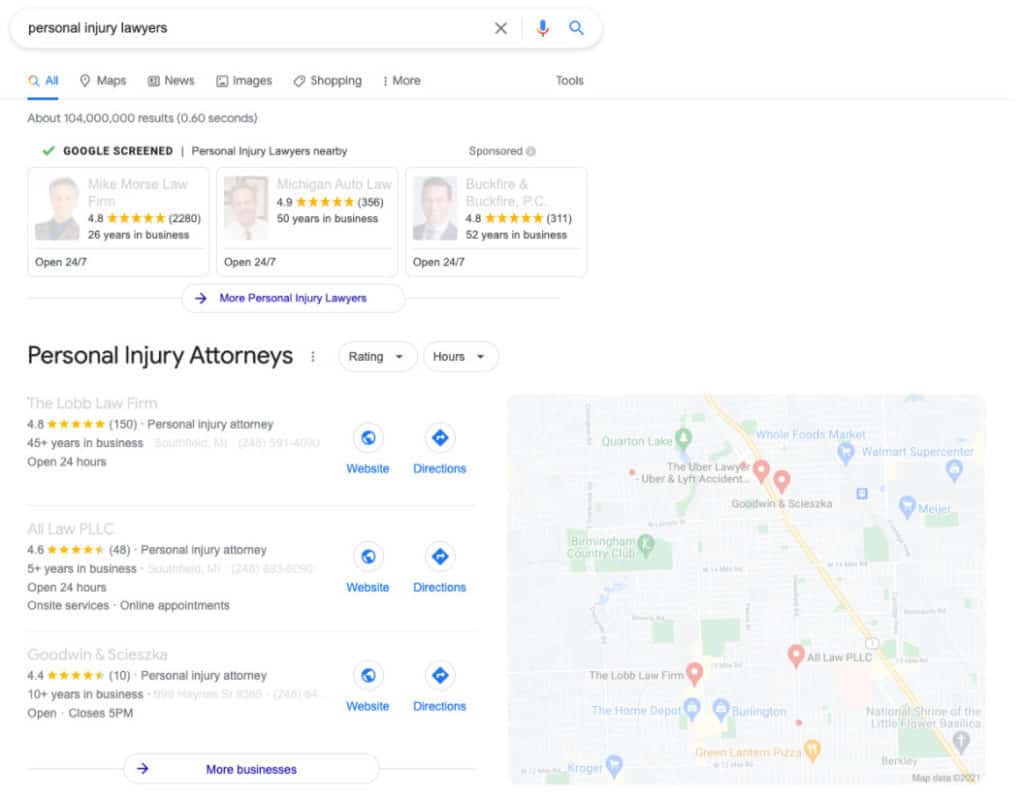
If you're a lawyer, or work at a law firm, at some point, you'll likely consider whether to hire someone to perform SEO services. We've been providing SEO services for law firms since 2008. Here are some things we've learned over the years that might help you make a more informed decision about selecting SEO services for your law firm.
Perhaps the most important piece of advice we can share is to define success at the beginning of the relationship. You'll likely encounter a lot of resistance from SEO companies on this point. Admittedly, forecasting results from SEO is difficult. But anyone worth considering should at least be willing to have a conversation about accountability for results.
To us, results ought to be defined in business metrics. Here are some examples:
Notice that each of these metrics is tied to something of value to your law practice. Notice also that they relate to organic search. In our experience, too many SEO services providers are either unwilling to define success metrics upfront or focus on the wrong metrics altogether. For example, a lot of SEO companies will report on:
From a business standpoint, none of these are directly tied to value for your law firm. For example, generating traffic that doesn't turn into clients is meaningless. Likewise, ranking for queries that generate clients is meaningless. Be sure to ask questions about how the SEO agency will define success at the start of the relationship.
Ideally, they'll be willing to talk about benchmarking and forecasting. In order to provide a reliable forecast, they will need to understand where your firm stands today with respect to SEO. With proper data, they should be willing to commit to some growth metric over some period of time. Whatever they're ultimately willing to commit to, you must determine whether it works economically for your law firm.
Another important question to ask pertains to whether they're working with your competition. At the end of the day, SEO is a winner-takes-most game. Most search users will click on one of the first few search results. Your SEO agency can't rank both your law firm's website, as well as, your competitor's. Therefore, it's imperative that they commit to some level of exclusivity. You'll have to decide the appropriate arrangement for your practice. Common examples of exclusivity include:
It's worth noting that the more exclusivity you need, the higher the fee you'll likely pay for it. While it varies from firm to firm, we tend to recommend exclusivity at the city or county level.
Another subject to discuss when vetting a law firm SEO company is their experience working with law firms like yours. Some companies will say they're experts in law firm SEO, but in reality, lawyers only make up a very small part of their client base. Among those that actually specialize in law firm SEO, some will likely work in low competitive practice areas and locations. That experience might not be relevant if your firm is in a highly competitive practice area and market. Make sure their experience matches your practice and objectives.

You should also demand full transparency from your law firm's SEO company. They should commit to communicating exactly what they're doing and why they're doing it. Lack of transparency is one of the biggest issues we regularly encounter from SEO companies. It can have serious consequences for your law firm including:
The best SEO companies for law firms will gladly share their approach to service delivery. They should also be clear about how they'll communicate with you and with what frequency. Here are some things you should be asking about:
These questions are crucial and go to the heart of what the working relationship will be like.

The best law firm marketing companies understand the interplay between SEO services for law firms and other marketing channels. A solid digital marketing agency for law firms should have some experience with all the major digital channels including:
They should also have at least some familiarity with offline media and advertising, as well as, reputation management. After all, the practice of law remains largely and reputation and relationships business. SEO services for law firms that don't take a holistic approach to marketing your law practice are likely to underachieve in terms of hitting performance targets.

Most law firms will benefit from SEO. Even if your practice is primarily referral-based, your next clients will turn to search engines to find information about you.

Lawyer SEO is anything you can do to optimize the experience of a searcher to supply their demand for information.

Legal services consumers turn to search engines to get answers to their questions, research specific law firms, and find legal help. SEO includes optimizing your law firm's presence in those searches.

It really depends on what services you need, what your goals are, and the competitiveness of your search landscape. I recognize that this might not be the most helpful answer, but it's the most honest way I can answer the question.

Lawyer SEO is only as expensive as its inability to achieve an objective. I think of SEO as an investment. In that context, its relative expansiveness is connected to its return.

It depends. Basic law firm SEO is relatively easy if you know some basics about how search engines work, HTML, and online publishing. On the other hand, law firm SEO can be quite difficult in terms of achieving a specific business objective in a competitive market.